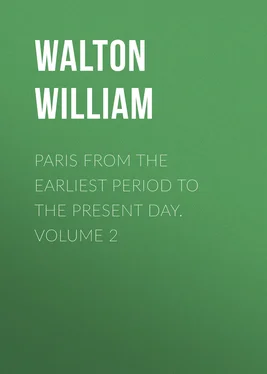William Walton - Paris from the Earliest Period to the Present Day. Volume 2
Здесь есть возможность читать онлайн «William Walton - Paris from the Earliest Period to the Present Day. Volume 2» — ознакомительный отрывок электронной книги совершенно бесплатно, а после прочтения отрывка купить полную версию. В некоторых случаях можно слушать аудио, скачать через торрент в формате fb2 и присутствует краткое содержание. Жанр: Путешествия и география, История, foreign_edu, foreign_antique, foreign_prose, на английском языке. Описание произведения, (предисловие) а так же отзывы посетителей доступны на портале библиотеки ЛибКат.
- Название:Paris from the Earliest Period to the Present Day. Volume 2
- Автор:
- Жанр:
- Год:неизвестен
- ISBN:нет данных
- Рейтинг книги:3 / 5. Голосов: 1
-
Избранное:Добавить в избранное
- Отзывы:
-
Ваша оценка:
- 60
- 1
- 2
- 3
- 4
- 5
Paris from the Earliest Period to the Present Day. Volume 2: краткое содержание, описание и аннотация
Предлагаем к чтению аннотацию, описание, краткое содержание или предисловие (зависит от того, что написал сам автор книги «Paris from the Earliest Period to the Present Day. Volume 2»). Если вы не нашли необходимую информацию о книге — напишите в комментариях, мы постараемся отыскать её.
Paris from the Earliest Period to the Present Day. Volume 2 — читать онлайн ознакомительный отрывок
Ниже представлен текст книги, разбитый по страницам. Система сохранения места последней прочитанной страницы, позволяет с удобством читать онлайн бесплатно книгу «Paris from the Earliest Period to the Present Day. Volume 2», без необходимости каждый раз заново искать на чём Вы остановились. Поставьте закладку, и сможете в любой момент перейти на страницу, на которой закончили чтение.
Интервал:
Закладка:
So far, everything had gone well, but the day of violence was at hand. More than thirty thousand troops had been concentrated around Paris and Versailles by order of the court; the Parisians, uneasy at their presence, demanded their withdrawal, the king dismissed Necker instead. The next day, the disturbances broke out, the Gardes-Françaises fired on a detachment of one of the foreign regiments, the Royal-Allemand, the people rose, clamoring for arms, fabricated pikes, plundered the arsenal of the Hôtel des Invalides, and moved on the Bastille as by a common impulse. The governor, the Marquis de Launey, had made the best preparations for defence that he could, but he had only one hundred and fifteen men under his command, and these but little disposed to make a good stand; at the end of a combat of several hours, they forced him to capitulate, on the solemn promise of the besiegers that their lives should be spared,—a promise which was not kept. It is rather as the destruction of a hated instrument of tyranny than as a feat of arms that the French celebrate this event,—which inaugurated the long series of acts of bloodshed of the Revolution.
This news was received with such consternation at Versailles that the king commenced his half-hearted attempts to accept the situation and secure the friendship of his people. The next day, a royal courier announced to the inhabitants of Paris that, "relying upon the love and fidelity of his subjects," he had ordered the troops to leave the vicinity of the capital and of Versailles. The Assemblée sent a deputation of eighty members to Paris to confirm the news, there was universal rejoicing, a Te Deum at Notre-Dame, illuminations in the evening, Lafayette was appointed general of the Parisian militia and Bailly mayor of the city. On the 17th of July, the king made his famous visit to the Hôtel de Ville, was received by the new mayor and all the officers of the corporation, assumed the new tricolored cockade—with sufficient unwillingness,—and in response to the tumultuous acclamations of the crowd, swearing to defend his "legitimate authority," made them a little speech: "My people can always rely upon my love." "Louis might, on this day, have regained all hearts; but he was in nowise the man required for such times. The Revolution continued in his presence." On his return to Versailles, he consented to dismiss his cabinet of ministers and to recall Necker.
But misery and hunger were prevalent in Paris, and throughout the provinces the peasants had begun to burn convents and châteaux; the murder of former officers of the crown and the parading of their heads, and even of their hearts, through the streets had begun in the capital. In the celebrated sitting of the night of the 4th of August, the delegates of the nobility and the clergy voluntarily consented to the abolishment of all their privileges and feudal rights, of jurisdiction, of levying tithes by the clergy, privileges of persons, provinces, and cities. The right of redemption of all these privileges, excepting those which affected personal liberty, was stipulated, but this session was considered as memorable in establishing the dawn of equality, and the members of the Assemblée were saluted as "fathers of the country." Following the example of the American Congress, it was desired to draw up a declaration of the rights of the man and the citizen; those who wished to divide the legislative power into two branches, as in England, and give to the king the right of unlimited veto, were outvoted, some of the moderate members retired from the committee on the constitution,—on both sides the advocates of extreme measures came to the front. The regiment of Flanders was recalled to Versailles; the king refused the proposition which was made to him to take refuge in Metz, with the army of Bouillé, which would have brought on the civil war, but the final catastrophe was hastened, nevertheless, by an imprudent banquet given to the officers of the various regiments, even the foreign ones and those of the national guard, on the night of the 1st of October, in which foreign airs were played, healths drunk to the royal family, white cockades distributed by the ladies, and the tricolored ones, it was said, trampled under foot.
The starvation in Paris had become so general, that the people, in their ignorance, murmured: "Ah! if the king only knew of our miseries; he is good, but he is deceived by the courtiers; if he were only here, and not at Versailles!" The news of this banquet, and of another given the following day in the salle du manége , set fire to the powder, an army of women assembled, crying: "Bread! bread!" and, accompanied by a great multitude, set out for Versailles, notwithstanding all the efforts of Bailly and Lafayette. Some of the gardes du corps were killed, and their heads paraded through the streets on pikes; the royal family were brought back to Paris, virtually prisoners, and the Assemblée committed "the unpardonable fault" of following them, and thus placing itself also within the reach of the mob that had finally learned all its power. The great nobles had already begun to "emigrate," leaving the king defenceless in the hands of his enemies, and rendering his situation still more desperate by their intrigues with foreign powers, which brought about the first of the coalitions against France.
On the 5th of November, it was decreed, and promptly approved by the king, that the sittings of the Parlement of Paris should be suspended until further orders, their powers to be exercised by the Chambres des Vacations; on the 24th of March, 1790, this ancient body was formally abolished, on the grounds that the nation had not concurred in its election. The consideration of the innumerable reforms, civil and political, voted by the Assemblée in its complete reconstruction of the government belongs rather to the history of the nation than to that of the city,—the absolute monarchy was deprived of the power of making laws, establishing imposts, deciding on peace or war, and reduced to the condition of the first of the administrative branches of the government, with a civil list of twenty-five millions. Complete liberty of action was given to the press, to industry and commerce. The rights of primogeniture, of rendering estates inalienable, were abolished, and of confiscation, on the principle that the expiation should be strictly personal, like the fault. Protestants and Jews were admitted to all civic and civil rights, and the former recovered their property which had been incorporated in the domains of the State. All titles were abolished, the nobles were reduced to the condition of citizens, and the priests to those of public functionaries; the application of the death-penalty was greatly restricted; all Frenchmen, without regard to their birth or religion, were eligible to all public offices and all military grades; the ancient provincial departments of the nation were replaced by departments. "The territory of France is free throughout its length and breadth, like the persons who inhabit it."
To save the new State from bankruptcy, Necker proposed, and Mirabeau caused it to be voted by acclamation, that each citizen should sacrifice a quarter of his income. The domains of the Church were placed at the disposition of the nation , and the minister of finance was authorized to sell them to the amount of four hundred millions of livres, the State to take measures to provide suitably for the maintenance of religion and the support of its ministers, and the care of the poor. The crown-lands and the property of the émigrés , which were confiscated July 26, 1792, were also declared national property, biens nationaux , and these biens were said to be the dot of the new constitution. The collection of the revenue was simplified and made less vexatious, each citizen to contribute his just proportion.
Читать дальшеИнтервал:
Закладка:
Похожие книги на «Paris from the Earliest Period to the Present Day. Volume 2»
Представляем Вашему вниманию похожие книги на «Paris from the Earliest Period to the Present Day. Volume 2» списком для выбора. Мы отобрали схожую по названию и смыслу литературу в надежде предоставить читателям больше вариантов отыскать новые, интересные, ещё непрочитанные произведения.
Обсуждение, отзывы о книге «Paris from the Earliest Period to the Present Day. Volume 2» и просто собственные мнения читателей. Оставьте ваши комментарии, напишите, что Вы думаете о произведении, его смысле или главных героях. Укажите что конкретно понравилось, а что нет, и почему Вы так считаете.












